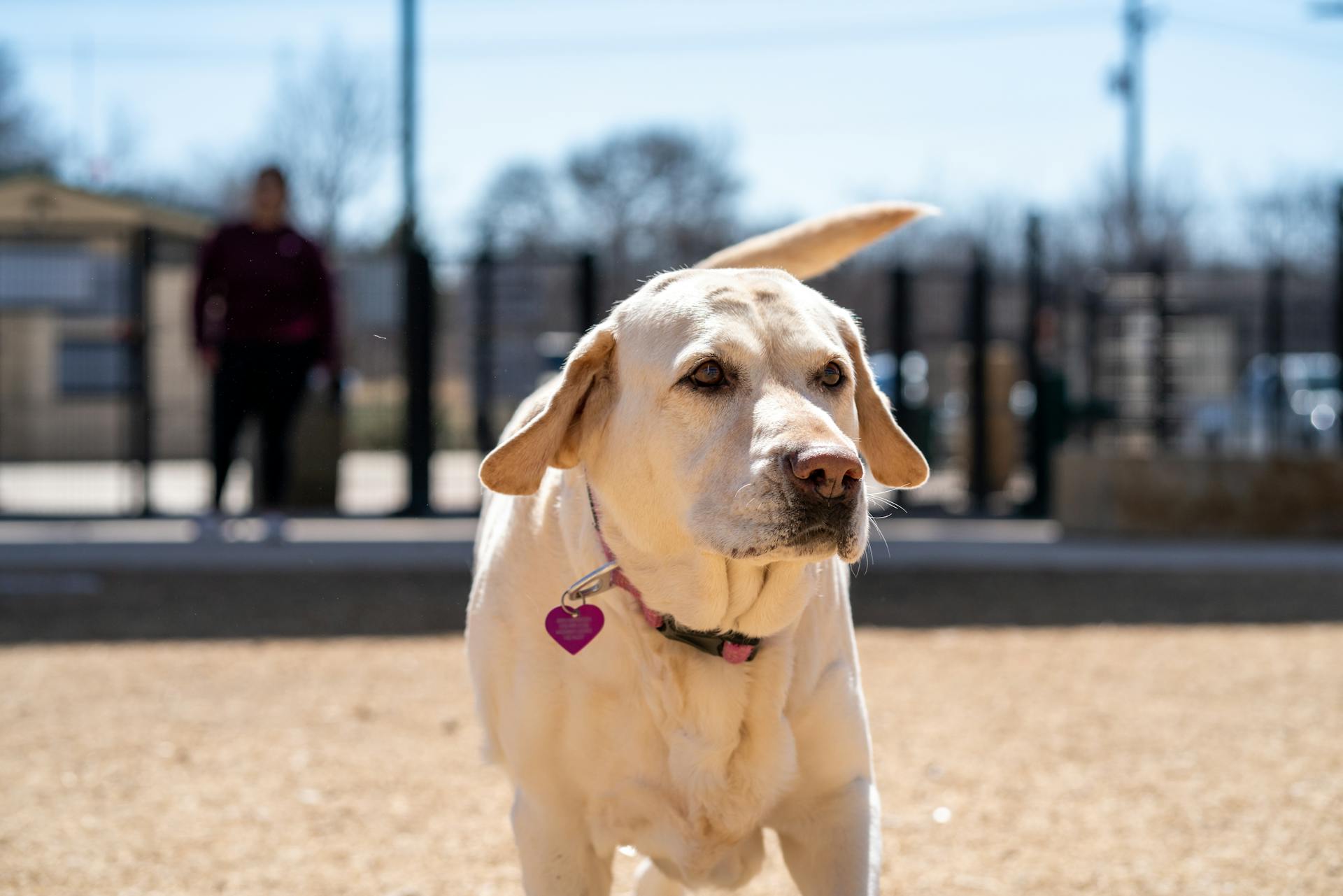
In the United States, the Fair Housing Act requires landlords to provide reasonable accommodations for tenants with disabilities, including those who require assistance animals.
Tenants with disabilities are protected by law, which means they can't be denied housing based on their disability or the need for an assistance animal.
The Department of Housing and Urban Development (HUD) enforces the Fair Housing Act and provides guidance on assistance animal policy.
Types of Assistance Animals
Assistance animals come in various forms, but they're typically animals commonly kept in households. Dogs, cats, small birds, rabbits, hamsters, gerbils, other rodents, fish, turtles, or other small, domesticated animals are examples of common household animals that can serve as assistance animals.
Service animals are a specific type of assistance animal, and they're defined as dogs individually trained to do work or perform tasks for people with disabilities. These tasks can include guiding people who are blind, alerting people who are deaf, or reminding a person with mental illness to take prescribed medications.
Emotional support animals, on the other hand, are any animals that provide therapeutic emotional help to someone with a disability, and they can be any common household animal. While service animals and emotional support animals are treated equally under the Fair Housing Act, they have distinct definitions and requirements.
Types of Assistance Animals
Service animals are typically dogs that are individually trained to do work or perform tasks for people with disabilities, such as guiding people who are blind or alerting people who are deaf.
Emotional Support Animals (ESAs) are any animals that are commonly kept in households who provide therapeutic emotional help to someone with a disability, like dogs, cats, small birds, rabbits, hamsters, gerbils, other rodents, fish, turtles, or other small, domesticated animals traditionally kept in the home.
Reptiles, with the exception of turtles, barnyard animals, monkeys, kangaroos, and other non-domesticated animals are not considered common household animals and may require special documentation to be considered as ESAs.
If you have a disability and want to keep a unique animal outside of the typical ESA, you'll need to demonstrate a disability-related therapeutic need for the specific animal or type of animal, such as an animal individually trained to do work or perform tasks that cannot be performed by a dog.
Miniature Horses
Miniature Horses are small, intelligent animals that can be trained to assist people with disabilities. They generally range in height from 24 inches to 34 inches measured to the shoulders.
Miniature Horses can be trained to do work or perform tasks for people with disabilities, just like service dogs. They are a viable option for individuals who need assistance.
To determine whether a Miniature Horse can be accommodated in a facility, entities must assess four key factors. These factors include whether the horse is housebroken, under the owner's control, and can fit within the facility's space and weight limits.
The presence of a Miniature Horse must not compromise legitimate safety requirements necessary for safe operation of the facility.
A unique perspective: Mini Horse as a Service Animal
Housing Providers' Responsibilities
As a housing provider, it's essential to understand your responsibilities regarding assistance animals. You can only ask specific questions to determine if a tenant's animal is an assistance animal.
You're allowed to ask if the animal is required because of a disability, which is a straightforward question. If the tenant answers yes, you can then ask what work or task the service animal has been trained to perform. This helps you understand the animal's purpose and potential impact on your property.
You also have the right to ask if the tenant has requested a reasonable accommodation to keep the animal, and if the tenant has an observable disability or if you already have information that suggests they do. This helps you determine if the tenant is eligible for an assistance animal.
If a tenant requests a reasonable accommodation for an assistance animal, you must consider their request. You can refuse the request if the specific animal poses a direct threat to the health or safety of others or would cause substantial physical damage. This decision must be based on an individualized assessment of the specific animal, not just its type or species.
Here are the questions you can ask a tenant to determine if their animal is an assistance animal:
- Is the animal required because of a disability?
- If the animal is a service animal, what work or task has the service animal been trained to perform?
- Has the tenant requested a reasonable accommodation to get or keep an animal in connection with a physical or mental impairment?
- Does the tenant have an observable disability or does the housing provider already have information that gives them reason to believe the tenant has a disability?
Requesting an Accommodation
A reasonable accommodation is a change in a rule, policy, practice, or service that may be necessary to allow a person with a disability the equal opportunity to use and enjoy their home.
To request a reasonable accommodation, you can make a verbal or written request to your housing provider. It's a good idea to make your request in writing and keep a copy for your records. You can request a reasonable accommodation at any point in your tenancy, even if it's not related to the application or lease signing process.
Requests for reasonable accommodations can be made on behalf of a person with a disability by a legal guardian or authorized representative. This means that a family member or caregiver can request an accommodation for you if you need assistance.
Housing providers can only refuse a request if the specific animal you're requesting poses a direct threat to the health or safety of others, or would cause substantial physical damage. This is an individualized assessment, not a generalization based on the type or species of the animal.
Here are the steps to request a reasonable accommodation:
- Submit a written request to your housing provider
- Provide a letter from a healthcare provider explaining your need for an assistance animal
- Keep a copy of your request for your records
Accommodation Process and Rules
A reasonable accommodation is a change in a rule, policy, practice, or service of a housing provider that may be necessary to allow a person with a disability the equal opportunity to use and enjoy their home.
To request an ESA (Emotional Support Animal), students must complete a specific process. This involves submitting a letter explaining the need for the ESA and a signed letter from a healthcare provider who has evaluated and treated the student face-to-face.
The healthcare provider's letter must include information about the student's disability and recommended treatment. After submitting these letters, the college reviews the request and evaluates the documentation.
Here are the steps to request an ESA:
- Submit a letter explaining the need for the ESA.
- Submit a signed letter from a healthcare provider who has evaluated and treated the student face-to-face.
- Wait for the college to review and approve the request.
A disability is defined as a physical or mental impairment that substantially limits one or more major life activities, such as walking, eating, sleeping, speaking, hearing, or caring for oneself.
Approval Process
The approval process for assistance animals can be a bit complex, but don't worry, I've got the lowdown.
Requests for assistance animals can be made verbally or in writing, and it's always a good idea to put it in writing and keep a copy for your records.
In some cases, a request can be made on behalf of a person with a disability by a legal guardian or authorized representative.
Housing providers can refuse a request if the specific animal poses a direct threat to the health or safety of others or would cause substantial physical damage.
The direct threat has to be an individualized assessment on the specific animal and not just a generalization on the type or species of the animal.
If you're a student in need of an assistance animal, you'll need to submit a formal accommodation request to the disability services coordinator.
All requests will be reviewed by a committee of employees, including the supervising vice president of student life, a resident director, and a representative of the Campus Facilities department.
You'll need to submit your request well in advance of housing needs, as all requests will be reviewed and processed within 60 days of receipt.
Here are the key players involved in the approval process:
If you're requesting an Emotional Support Animal (ESA), you'll need to complete a specific process, including submitting a letter explaining your need for the ESA and a signed letter from your healthcare provider.
Suggestion: Assistance Animal Letter
Conflicting Disabilities
If you have a medical condition like asthma or allergies that's affected by the presence of animals, you need to contact the supervising vice president of student life or disability services coordinator.
These individuals will work with you to resolve the issue, and you may be asked to provide verifiable medical documentation to support your claim.
The needs of both you and the person with the animal will be considered in resolving the conflict.
If an allergy or other conflict resulting from the animal's presence cannot be resolved agreeably, residence life staff, the supervising vice president of student life, and the disability services coordinator will collaborate to find a solution.
In the event of a conflict in living spaces, the person assigned to the residence hall first will remain in their assigned housing.
Untimely requests for an assistance animal may result in denial of the request or a requirement to move to designated assistance animal housing.
Accommodation Location and Control
A reasonable accommodation is a change in a rule, policy, practice, or service of a housing provider that may be necessary to allow a person with a disability the equal opportunity to use and enjoy their home.
Service animals must be under the control of their handler, but this can be tricky. In some cases, a harness, leash, or tether may interfere with the animal's safe and effective performance of tasks, so the handler must maintain control through voice, signal, or other effective controls.
In general, service animals are allowed to accompany people with disabilities in all areas of a facility where the public is allowed to go, such as patient rooms, clinics, and cafeterias.
Where Are Allowed
Service animals are allowed in all areas of a facility where the public is allowed to go, under the ADA.
State and local governments, businesses, and nonprofit organizations that serve the public generally must allow service animals to accompany people with disabilities.

In hospitals, service animals usually shouldn't be excluded from areas like patient rooms, clinics, cafeterias, or examination rooms.
However, operating rooms or burn units may be off-limits to service animals to maintain a sterile environment.
Service animals are not automatically allowed in areas where their presence might compromise a sterile environment, like operating rooms or burn units.
It's essential to understand the specific rules and regulations in place to ensure service animals can accompany people with disabilities in all areas of a facility.
Control
Control is a crucial aspect of service animals. A service animal must be under the control of its handler at all times.
In most cases, service animals are harnessed, leashed, or tethered to maintain control. However, there are exceptions for individuals with disabilities that prevent the use of these devices.
Service animals can be controlled through voice, signal, or other effective controls if using devices like harnesses, leashes, or tethers would interfere with their safe and effective performance of tasks.
Frequently Asked Questions
Can someone ask me for papers on my service dog?
No, you cannot ask for papers or proof that my service dog is registered, licensed, or certified. Service animals are protected by law, and asking for documentation is not allowed.
What is the new Florida law on Emotional Support Animals?
In Florida, the Fair Housing Act protects individuals with emotional support animals from restrictions, eviction, and charges, as long as they provide proof of need. Learn more about your rights and responsibilities regarding emotional support animals in Florida.
When can a landlord legally reject an ESA in Pennsylvania?
In Pennsylvania, a landlord can legally reject an Emotional Support Animal (ESA) request only if allowing it would cause an undue financial and administrative burden. This is a limited exception that requires the landlord to demonstrate a significant hardship.
Sources
- https://www.stlawu.edu/offices/human-resources/service-and-assistance-animal-policy
- https://a.arlawhelp.org/landlord-tenant/assistance-animals-in-housing
- https://policies.uic.edu/uic-policy-library/access-and-equity/service-and-assistance-animal-policy/
- https://www.hesston.edu/student-life/student-handbook/policies/assistance-animal-policy/
- https://www.ada.gov/resources/service-animals-2010-requirements/
Featured Images: pexels.com


